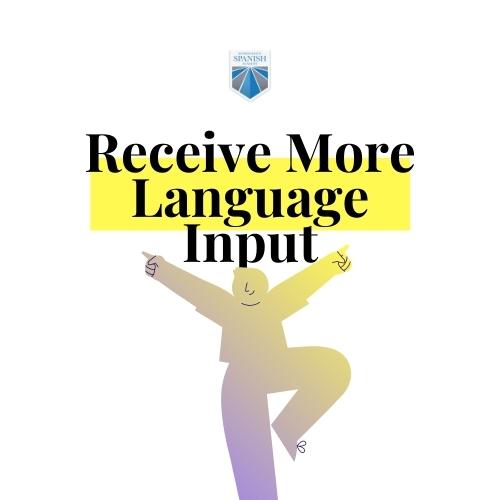
10 Reasons to Learn Language With Native Speakers
When first starting out, most language learners are scared to speak with native speakers. They worry about mistakes and misunderstandings.
While the occasional conversational mishap is normal, there is one key way to prevent it from occurring too often.
Having a native speaker as your teacher is the best way to prepare for a future language exchange.
From perfecting your pronunciation to diving deeper into the culture, there are plenty of reasons to learn language with native speakers.
This guide explains the pros and cons of the language teacher types and lists 10 benefits of language learning with native speakers.
Are you ready to start sounding like a native Spanish speaker? Stay tuned for quick and easy language learning tips along the way!
Table of Contents:
- Native vs. Non-Native Language Teachers: Which Should You Pick?
- 10 Reasons to Learn a Foreign Language with Native Speakers
- Take a Free Class with a Native Spanish-Speaker
Native vs. Non-Native Language Teachers: Which Should You Pick?
According to Cambridge Dictionary, a native speaker is, “someone who has spoken a particular language since they were a baby, rather than having learned it as a child or adult.”
Ultimately, there is no right or wrong choice when it comes to picking a language teacher. Both native and non-natvie language teachers are capable of educating their students.
That said, here are a few key pros and cons to be aware of when choosing your next language instructor.
Non-Native Teacher
Non-native teachers can also be effective language instructors. These professionals spent years studying their second language—just like you’re doing now!
Thanks to this experience, they know exactly which grammar topics are the hardest to grasp and which ones come with ease. Additionally, they are often more adept at grammar and language rules since they rely on them so strongly.
Native Teacher
In the same vein, native teachers could potentially have a disadvantage if they’re not fully educated on how to teach their native language.
At Homeschool Spanish Academy, we provide the native-language instruction with certified teachers who understand how to teach Spanish according to the needs of each student.
10 Reasons to Learn a Foreign Language with Native Speakers
Check out the top 10 reasons to learn Spanish, or any language, with native speakers.
1. Understand Native Speakers Better
One advantage of having a native speaker as a teacher is that they know the language. Not only do they speak it fluently, but they’re also able to model its use in a particularly natural way.
According to Psychology Today, “The less [of a foreign language] we understand, the more we feel that the rate [of speech] is high.” This research explains why native speakers of your second language appear to talk at faster speeds.
Conversing with a native speaker during lessons enhances your ability to talk to native speakers outside of class. Familiarizing yourself with common native speech patterns and lingo makes it easier to understand native speakers.

Language learning tip: Supplement your classroom learning with shows, songs, and podcasts in your target language to further train your ear.
2. Practice Correct Pronunciation
According to the Canadian Center of Science and Education (CCSE), “Pronunciation must be viewed as a crucial and integral part of communication that should be incorporated into classroom activities.”
In other words, pronunciation plays a critical role in supporting language learners and their ability to communicate effectively.
When you listen to native speakers, you get to hear how foriegn words sound when pronounced correctly. Native speakers tend to have better pronunciation since they learned the language from authentic sources.
By mimicking a native speaker, you establish correct pronunciation habits.

3. Learn More About the Culture
Language and culture are interconnected in a multitude of ways.
According to Kuo (2006), “To achieve true linguistic comprehension, culture and language should be learned together. After all, the more cultural concepts we learn, the more language abilities we gain; the more language we gain, the more competitiveness we have.”
Native speakers are well aware of cultural information and insights. Most instructors are proud and eager to share their home customs and traditions with you.
The more you understand about the culture, the easier it will be to understand foreign idioms and cultural references.

Language learning tip: For an even greater cultural and language experience, consider studying abroad or working in a country that speaks your target language.
4. Understand Local Slang
Colloquial speech is highly integrated into language. You can’t master a second language without acquiring at least some slang terms.
According to Bradford (2021), “Even if the learner might not produce some of the colloquial language or slang language himself, it is still necessary to understand this language for comprehension in movies, television, other forms of media, and basic conversation with peers. “
Slang is an essential part of informal communication. Naturally, native speakers are well-versed in common colloquialism and help you master this essential part of language.

5. Receive More Language Input
According to Medyges (1992), “The comfort and confidence with the language (and perhaps habit) compels the NST [native speaker teachers] to use the language in various facets of the classroom, not just content-related or lesson-specific language.”
Unsurprisingly, native speakers have more confidence in their language.
This conviction leads them to incorporate language into the lesson through multiple angles. Students tend to receive more language input as a result of this deeper dive.

6. Enhance Your Ability to Hold Conversations
As Medyges (1992) also noted, “NSTs [native speaker teachers] are proficient with use of spontaneous language making them more suitable for teaching conversation.”
Native speakers have more socialization and conversational experience. This extensive practice allows them to intuitively flow with spontaneous discussions.

Language learning tip: Pick a language learning app or program like Homeschool Spanish Academy that incorporates natural conversation into each lesson.
7. Discover New Expressions and Gestures
Language is more than just words.
Every sign language speaker understands the power behind facial expressions, gestures, and hand movements. However, this body language is also important for spoken languages.
According to CNN, body language constitutes the majority of our overall communication.
It’s difficult to find lessons in foreign body language and hand gestures. Luckily, your native teacher is already an expert in this field.
They naturally mimic their language’s common body movements and expressions during your conversations together. This enables you to easily pick up the new movements and incorporate them into your speaking.

8. Grasp a Specific Dialect
According to Bowen (2011), learning about dialects, “raises awareness of language diversity.”
Widely spoken languages like Spanish, English, and Chinese have multiple dialects. In fact, the Spanish language alone has more than 15 dialects.
A dialect is a regional or local version of a language. Dialects can be linguistically differentiated via grammar, pronunciation, or vocabulary.
If you plan to visit or live in a specific region or country, it is important to understand the local dialect. Although dialects are mutually intelligible, certain dialects sound difficult to untrained ears.

Language learning tip: Find a native speaker who is from the area that you want to travel to. Practicing with them will enable you to quickly master the regional dialect.
9. Gain Stronger Motivation
Did you know that having a native speaker teacher can affect how you view your target language?
Åžahin (2005) illustrates that “learners who are exposed to native speaker teachers of English have more positive attitudes toward the target language community and are more successful in English lessons compared to those who are not exposed to any native speaker teachers of English.”
It is reassuring to be able to use your target language with a native speaker regularly. This constant interaction reinforces the idea that you are learning a tangible skill.
Furthermore, getting to know a native speaker on a more personal level and learning about their way of life is a powerful motivator for language learning.

10. Make Friends Around the World
At first, your language teacher is just another instructor. However, after enough time, this educational professional may become a lifelong friend.
As you practice talking about your day, favorite interests, and likes and dislikes, you eventually establish a meaningful friendship with your teacher.

Language learning tip: Consider asking your teacher for a tour (either virtually or in-person) of their home city. For example, all Homeschool Spanish Academy teachers are from Antingua, Guatemala and will be pleased to give you valuable insights into their beautiful hometown.
Take a Free Class with a Native Spanish-Speaker
Are you trying to decide which foreign language to learn?
With the second-highest number of native speakers in the world, Spanish is an amazing choice. If you learn Spanish, you can practice with some of the 41 million native Spanish speakers who live in the United States.
Additionally, as a Category 1 language, Spanish is one of the easiest languages for English speakers to learn, thanks to their shared Latin roots.
Learn this lovely language with native speakers at Homeschool Spanish Academy. Our native Spanish-speaking teachers from Guatemala are trained to help you perfect your pronunciation, learn useful slang, and explore Hispanic culture.
Sign up for a free trial class today and level up your fluency! We make it easy to learn language online with native speakers by offering flexible scheduling, tailored programs, and affordable pricing.

Join one of the 40,000 classes that we teach each month and you can experience results like these

“It’s a great way to learn Spanish, from native Spanish speakers in a 1-on-1 environment. It’s been fairly easy to schedule classes around my daughter’s other classes. The best value for us has been ordering multiple classes at a time. All the instructors have been great!”
– Cindy D, Parent of 3

“It’s great being able to interact with native speaking people and having a conversation with them not just doing all the work on paper. It’s also an amazing opportunity to speak with native Spanish-speaking people without having to travel to a native Spanish-speaking country.”
– Melanie

“HSA offers very affordable, quality, one on one classes with a native speaker. My son has greatly benefited from taking classes. We have seen his confidence increase as well as his pronunciation improve, because he learns from a native Spanish speaker. HSA has quick, personal customer service. Our family has been very pleased with our experience so far!”
– Erica P. Parent of 1
Want to learn more about the Spanish language? Check out our latest posts!
- How to Finally Roll Your R’s – And Why It’s Not a Big Deal If You Can’t
- The 25 Most Useful Spanish Phrases You Need to Lear Today
- From ‘Hola’ to Holding Conversations: Your 30-Day Beginner Spanish Challenge
- How to Learn Spanish as an Adult (Even If You Think It’s Too Late)
- Spanish Fluency for Beginners: Why 1-on-1 Lessons Work Best for Elementary Kids
- 5 Proven Ways to Boost Spanish Proficiency in Elementary Beginners — Even If You Don’t Speak Spanish
- 5 Mistakes That Prevent Kids from Improving Spanish — and How Parents Can Help Fix Them
- How to Help Your Child Speak Spanish with Confidence (Without Feeling Embarrassed!)
- How to Talk About the Temperature in Spanish: Fahrenheit, Celcius, and Descriptions - February 8, 2024
- How To Use the Spanish Verb ‘Parecer’ - February 12, 2023
- How To Write Dates in Spanish - January 28, 2023





